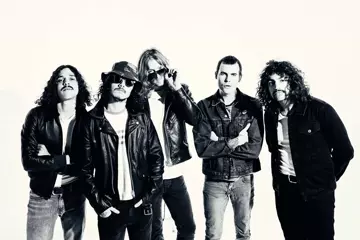The inhuman horrors of our nation's colonial past are old wounds that contemporary Australians, both non-indigenous and Aboriginal, are still unsure how to heal. There is a collective recognition: that is who we were, not who we are. And yet, the very idea of severing ties with that shameful history, which continues to be enshrined in national celebrations like Australia/Invasion Day, is still considered a radical affront to the Aussie identity. Acknowledging and ultimately reconciling the undeniable cataclysm of European settlement - something that in just two-and-a-half centuries has arrested a rich and vibrant culture some 60,000 years in the making - remains an elusive, and some might argue, insurmountable goal.
Navigating the emotional and historical complexities of this ongoing debate is fraught with controversy, and so it was for author Kate Grenville when her landmark novel, The Secret River, was first published in 2005, drawing both acclaim and contention. Inspired by research into her own family's convict heritage, her book tells the story of William Thornhill, a criminal transported with his family from his native Britain to the remote and inhospitable fledgling settlement of Sydney, in 1806. In this hostile and alien place, on the banks of the Hawkesbury, Thornhill discovers the human cost of frontier life and the brutality this unfamiliar world - and its people - inspires among his fellow settlers.
Critics of the book slammed Grenville, a white Australian, for exploiting the very real historical atrocities committed against Indigenous communities, in the service of fiction. Other detractors accused the author of muddying the distinction between fact and fantasy, thus contributing to the problematic disinformation of the so-called "history wars". In adapting Grenville's novel for the stage in 2013, celebrated theatre-maker and Adelaide Festival Director Neil Armfield faced a similar quandary, but he maintains that bringing this story into the viscerally charged arena of live performance is a valid way of squaring up to the uncomfortable truths our country is built on.
"It's a tragic narrative, we're all aware of that. But it's also an extremely compelling narrative," Armfield observes. "There are, in spite of its tragic conclusion, moments of transcendent beauty and great humour. There is a theatricality about the way this story is presented, in the sense that it is a kind of ritual, that allows us to always know that we're in a world of theatrical expression. That sets up a kind of poetic frame from which you can experience the story in a very different way to in Grenville's novel or in a history book."
"This story belongs to me as well. I believe it belongs to all people. I don't agree with the notion that you can put up borders in art"
Don't miss a beat with our FREE daily newsletter
The idea to take The Secret River from the page to the stage was first suggested by Cate Blanchett and her husband, playwright and director Andrew Upton, when the pair first took the reins of Sydney Theatre Company as artistic directors, in 2008. "I said to Cate at the time, 'You know, if you're hoping for something like Cloudstreet - which I had previously directed and was a kind of joyous, human, grand theatrical event - it won't be like that.' This is a tragic story, not a feel-good experience," Armfield recalls.
Nonetheless, Blanchett and Upton's invitation for Armfield to collaborate with playwright Andrew Bovell and Bangarra Dance Theatre's artistic director Stephen Page began a process of development lasting several years. "As we took this story and workshopped it with actors, Steven, Andrew and I had this anxiety about where we were headed. It really wasn't until at the end of 2012, when we closed the rehearsal room doors, that we began to feel that it was going somewhere," he admits. "It was my job to take this story and make the journey for the audience as interesting, as tender, as funny and complete as it could be. I must say, I loved that rehearsal period, in spite of all the pain we experienced in gathering this story together, because everyone felt that we were doing something absolutely worthwhile."
Indeed, Armfield and his collaborators were proven right. The production received a rave reception during its premiere season and went on to rack up an impressive six Helpmann Awards. But despite this reassuring success, it's a show that has continued to evolve. Surtitling of the Indigenous languages in the play was brought in for its first revival, but then quickly dropped (Armfield notes that the Indigenous cast, who were against the idea of translations, were "all extremely grateful and vindicated when we cancelled the surtitle experiment"). Now, in perhaps its biggest adjustment to date, The Secret River will be staged outdoors at Adelaide's Anstey Hill Quarry, explicitly linking this Australian story with the land that plays such a pivotal role in its telling.
Questions about the ownership of this dark chapter in Australia's history and the manner in which it is preserved and remembered remains thorny. But Armfield is passionately convinced that the theatre can and should be a tool for excavating the truth of our nation's past. "This story belongs to me as well. I believe it belongs to all people. I don't agree with the notion that you can put up borders in art," he insists. "I certainly think you can be challenged or criticised for ignorance, or arrogance, or lack of empathy or genuine understanding. But I think if the intention is right and the exploration is as full and as rich as you can make it, then you're on the right path."
Adelaide Festival presents The Secret River, 28 Feb — 19 Mar, The Quarry, Anstey Hill Recreation Park.















